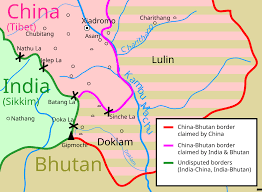The Doklam Stand-off: Recent Developments and Impact

Introduction
The Doklam region, a disputed territory near the tri-border of India, Bhutan, and China, has been a focal point for geopolitical tensions between India and China. Given its strategic importance and the potential for conflict, understanding the dynamics surrounding Doklam is crucial in assessing the current state of India-China relations.
Background of the Doklam Dispute
The Doklam standoff originated in June 2017 when Indian troops intervened to stop the Chinese military from constructing a road in the area claimed by Bhutan. This move was seen as a violation of the 2014 agreement between India and Bhutan, wherein India pledged to protect Bhutan’s territorial integrity. The confrontation led to a tense standoff that lasted for over two months, drawing significant international attention and diplomatic efforts to de-escalate the situation.
Recent Developments in 2023
As of 2023, both India and China have been engaging in complex dialogues regarding the Doklam region. Reports indicate that there has been a heightened military presence on both sides, with China reportedly continuing infrastructure development activities in the disputed area. In response, India has maintained a robust defense posture, reiterating its commitment to its ally Bhutan.
Diplomatic talks are ongoing, with recent engagements between the foreign ministers of both countries in multilateral forums. The Indian government remains vigilant and is focused on maintaining peace and stability in the region, while also ensuring that Bhutan’s sovereignty is not compromised.
Implications for India-China Relations
The Doklam dispute is not just a territorial issue but forms part of a broader spectrum of Sino-Indian relations, which have been marred by border disputes and confrontations. The area is viewed as a critical strategic point for India, capable of facilitating access to the North-East region, while also countering Chinese influence in the Indian Ocean and South Asia.
As both nations seek to manage their rivalry, the implications of the Doklam issue could play a pivotal role in future engagements. Analysts predict that unless a resolution is achieved, tensions may escalate, affecting bilateral trade and cooperation in other areas, including counter-terrorism and climate change.
Conclusion
The situation in Doklam remains a significant concern for India, Bhutan, and China, reflecting deeper strategic interests in the region. Observers are encouraged to monitor the developments closely as they could have far-reaching consequences for regional stability and international relations in Asia. The need for dialogue and diplomacy continues to be paramount in preventing conflicts that may arise from misunderstandings and military confrontations in this contested region.









